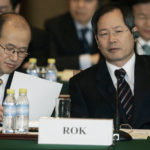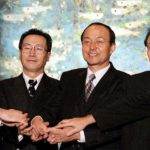May 14, 2018, by Joseph S. Bermudez Jr. and Beyond Parallel—
The exact origins of North Korea’s nuclear program are still shrouded in mystery despite being the object of study for over twenty-five years. Contrary to common perception, early satellite imagery from the Central Intelligence Agency, taken on December 15, 1962 and June 27, 1963, shows that construction on the Yongbyon Nuclear Research Center in North Korea started sometime after June 27, 1963 and before July 16, 1964.
April 23, 2018, by Joseph S. Bermudez Jr. and Beyond Parallel—
Despite being the subject of intense study for almost 60 years there is remarkably little independently verifiable information concerning the development of North Korea’s nuclear infrastructure available at the unclassified level. This series of reports entitled "Yongbyon Declassified," tries to rectify that by examining high-resolution satellite imagery acquired by early U.S. reconnaissance programs.
March 2, 2018, by Victor Cha and Marie DuMond—
Reports of ubiquitous celebrations of nuclear weapons accomplishments stand in stark contrast with a new micro-survey commissioned by Beyond Parallel of North Korean citizens. Conducted throughout the summer and fall of 2017 with a cross-section of North Korean citizens, the vast majority of North Korean respondents did not have a positive attitude toward their country’s nuclear weapons program.
December 4, 2017, by Marie DuMond—
South Korea and the United States generally share similar estimations of China’s and Japan’s blind spots in a unification scenario. Both believe that Beijing has the most prominent blind spot on domestic stabilization and refugees, and that Japan shares similar concerns, suggesting that all four powers could prioritize law and order in a unification scenario.
November 13, 2017, by Marie DuMond—
Beyond Parallel’s first-ever survey of expert assessments on unification-related issues indicate South Korea and the United States share the common view that domestic stabilization and unification costs constitute the most critical unification blind spots with a high degree of concern but low levels of knowledge for both countries.
October 18, 2017, by Marie DuMond—
Domestic stabilization is the most critical issue with unification for South Korean officials and experts, registering the highest composite score (i.e., high level of concern and low level of knowledge). This means civil-military relations, law and order, and stability in the North represent the issues for which Koreans see great consequences for national interests, but for which they have little prior knowledge or understanding. Hence, it is the greatest potential “blind spot” of unification. Costs related to unification rank a close second for South Koreans, followed by refugees, nuclear weapons, and human rights.
October 2, 2017—
The debate over how to deal with North Korea’s nuclear program has been raging for nearly 25 years. In this study, CSIS Beyond Parallel collected information on negotiations between the U.S. and North Korea to shed light on the present nuclear dilemma.
September 6, 2017—
North Korea conducted its sixth nuclear test on September 3, 2017. North Korean state media announced that the test was of a hydrogen bomb that could fit on the top of an intercontinental ballistic missile (ICBM)... On September 3, North Korea conducted its sixth nuclear test. North Korean state media announced…
August 9, 2017—
The objective of the Six Party Talks was to resolve the North Korean nuclear problem through multilateral negotiations. In this Living History interview, Ambassador Chun Yung-woo reflects upon his experience negotiating with the Americans, Chinese and North Koreans during the Six Party Talks and also discusses his later role as National Security Advisor to ROK President Lee Myung-bak.
March 8, 2017—
Ambassador Christopher Hill reflects on his personal experience as Assistant Secretary of State for East Asian and Pacific Affairs and head of the U.S. delegation to the Six Party Talks from 2005 to 2009... In 2003, the Six Party Talks were launched to seek a peaceful resolution to the…










